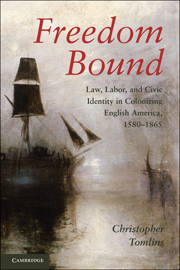Part III - “What, then, is the American, this new man?”
Published online by Cambridge University Press: 05 June 2012
Summary
“What, then, is the American, this new man?”
’Tis with pleasing wonder that we look back upon this country in general, and this town in particular, and compare the present condition and appearance with what they were a century ago, yea but little more than half a century ago. Instead of a desolate uncultivated wilderness – instead of mountains and plains covered with thick untraversed woods – and swamps hideous and impassable, the face of the earth is trimmed, and adorned with a beautiful variety of fields, meadows, orchards and pastures. The desert blossoms as the rose: the little hills rejoice on every side; the pastures are clothed with flocks, the valleys also are covered over with corn; they shout for joy, they also sing. Instead of the dreary haunts of savage beasts, and more savage men, wounding the ear and terrifying the heart with their dismal yells, we find now only harmless retreats, where the fowls of heaven have their habitation which sing among the branches. Instead of the smoaky huts and wigwams of naked swarthy barbarians, we now behold thick settlements of a civilized people and convenient and elegant buildings … improvements in arts, agriculture and all the elegances of life.
Nathan Fiske, Remarkable Providences to be Gratefully Recollected, Religiously Improved, and Carefully Transmitted to Posterity. A sermon preached at Brookfield on the last day of the year 1775.- Type
- Chapter
- Information
- Freedom BoundLaw, Labor, and Civic Identity in Colonizing English America, 1580–1865, pp. 333 - 334Publisher: Cambridge University PressPrint publication year: 2010



